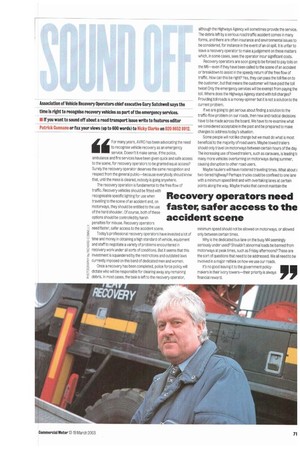d For many years. AVRO has been advocating the need
Page 71

If you've noticed an error in this article please click here to report it so we can fix it.
to recognise vehicle recovery as an emergency service. Doesn't it make sense. if the police, ambulance and fire services have been given quick and safe access to the scene, for recovery operators to be granted equal access? Surely the recovery operator deserves the same recognition and respect from the general public—because everybody should know that, until the mass is cleared, nobody is going anywhere.
The recovery operation is fundamental to the free flow of traffic, Recovery vehicles should be fitted with recognisable specific lighting for use when travelfing to the scene of an accident and, on motorways. they should be entitled to the use of the hard shoulder. Of course, both of these options should be controlled by harsh penalties for misuse. Recovery operators need faster, safer access to the accident scene.
Today's professional recovery operators have invested a lot of time and money in obtaining a high standard of vehicle, equipment and staff to negotiate a variety of problems encountered in recovery work under all sorts of conditions. But it seems that this investment is squandered by the restrictions and outdated laws currently imposed on this band of dedicated men and women.
Once a recovery has been completed, police force policy will dictate who will be responsible for clearing away any remaining debris. In most cases, the task is left to the recovery operator, although the Highways Agency will sometimes provide the service. The debris left by a serious road traffic accident comes in many forms, and there are often insurance and environmental issues to be considered, for instance in the event of an oil spill. It is unfair to leave a recovery operator to make a judgement on these matters which, in some cases, sees the operator incur significant costs.
Recovery operators are soon going to be forced to pay tolls on the MS—even if they have been called to the scene of an accident or breakdown to assist in the speedy return of the free flow of traffic. How can this be right? Yes, they can pass the toll fee on to the customer, but that means the customer will have paid the toll twice! Only the emergency services will be exempt from paying the toll. Where does the Highways Agency stand with toll charges? Providing toll roads is a money-spinner but it is not a solution to the current problem.
If we are going to get serious about finding a solution to the traffic-flow problem on our roads, then new and radical decisions have to be made across the board. We have to re-examine what we considered acceptable in the past and be prepared to make changes to address today's situation.
Some people will netlike change but we must do what is most beneficial to the majority of road users. Maybe towed trailers should only travel on motorways between certain hours of the day. The increasing use of towed trailers, such as caravans, is leading u many more vehicles overturning on motorways during summer, causing disruption to other road users.
Maybe hauliers will have rostered travelling times. What about E two-tiered highway? Perhaps trucks could be confined to one lane with a minimum speed limit and with overtaking lanes at certain points along the way. Maybe trucks that cannot maintain the
minimum speed should not be allowed on motorways, or allowed only between certain times.
Why is the dedicated bus lane on the busy M4 seemingly seriously under used Shouldn't abnormal loads be banned from motorways at peak times, such as Friday afternoons? These are the sort of questions that need to be addressed. We all need to be involved in a major rethink on how we use our roads.
It's no good leaving it to the government policymakers in their ivory towers—their priority is always financial reward.
































































































































































































































